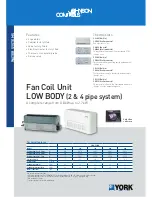
26
•
Residen al Hybrid Electric Heat Pump Water Heater Use and Care Guide
TR
OUBLE
SHOO
TING
5
Check/Reset Energy Cut O
ff
ECO Bu on.
Reset Button
1
2
FIgure 30 - Energy Cut O
ff
(ECO) bu on
The Energy Cut O
ff
(ECO) shuts o
ff
power to the water heater’s elements
if the temperature of the water in the
tank gets too hot. If the ECO has tripped,
you’ll have no hot water. A tripped ECO
can usually be reset, but you should
have a quali
fi
ed person inves gate the
cause of the overhea ng and repair the
problem. DO not turn the power back
on un l the cause of the overhea ng
has been iden
fi
ed and repaired.
To check the Energy Cut O
ff
(ECO)
• Turn off the power to the water
heater.
WARNING! Working near an ener-
gized circuit can result in severe injury
or death from electrical shock. Check
power wires in the electrical junc on
box with a non-contact circuit tester to
make sure power is o
ff
.
• Press the red ECO reset button (see
photo above).
• The ECO was tripped if you hear a
click when it is reset. In most cases a
tripped ECO indicates that the tank
overheated due to a problem with
one of the elements-have a qualified
person check the upper and lower
elements and replace if necessary.
• The ECO was not tripped if you didn’t
hear a click. In that case it should be
checked by a qualified person.
• Replace the insulation and the upper
access panel.
• Turn the power back on to the water
heater.
WARNING! Be sure all covers are
secured to reduce the risk of
fi
re and
electric shock.
Drips from T&P Relief
Valve Discharge Pipe
A small amount of water dripping from
the Temperature and Pressure (T&P)
Relief Valve usually means the home’s
water pressure is too high or you need a
properly sized and pressurized Thermal
Expansion Tank. Refer to Step 1 in the
Installa on sec on of this manual for
more informa on. A large amount of hot
water coming from the T&P discharge
pipe may be due to the tank overheat-
ing.
WARNING! Do not cap or plug the
T&P relief valve or discharge pipe, and
do not operate the water heater with-
out a func oning T&P Relief Valve - this
could cause an explosion.
Water pressure too high.
High water
pressure can cause the T&P Relief Valve
to drip. Install a Pressure Reducing Valve
(PRV) on the main cold water supply
line. Adjust the PRV to between 50 and
60 psi.
Thermal Expansion Tank.
Install a
Thermal Expansion Tank. If a Thermal
Expansion Tank is already installed and
the T&P Relief Valve discharge pipe
drips, the Thermal Expansion Tank may
be pressurized to the wrong pressure or
the internal bladder may be defec ve.
Refer to the instruc ons that came with
the Thermal Expansion Tank for more
informa on.
Debris.
In rare cases, debris can s ck in-
side the T&P Relief Valve preven ng the
valve from sea ng fully. In that case, the
T&P Relief Valve discharge pipe will drip.
You may be able to clear debris from the
T&P Relief Valve by manually opera ng
the valve, allowing small quan es of
water to
fl
ush out the debris. See the
label on the T&P Relief Valve for instruc-
ons.
If the water pressure is between 50
and 60 psi, a Thermal Expansion Tank
is installed and properly pressurized,
and the valve has been cleared of any
debris, and it s ll drips, the valve may be
broken—have a quali
fi
ed person replace
the T&P relief valve.
Water Odor
Harmless bacteria normally present in
tap water can mul ply in water heaters
and give o
ff
a “ro en egg” smell. A high-
er tank temperature se ng of 140° kills
the bacteria that causes “smelly water”
and can reduce the levels of bacteria
that cause water-borne disease. A prop-
erly adjusted Thermosta c Mixing Valve
should be installed at each point of use.
In some cases, the standard anode rod
that came with your water heater can be
replaced with a special zinc anode rod
which may help reduce or eliminate the
odor. Contact a quali
fi
ed person.
NOTE:
To protect the tank, an anode rod
must be installed in the water heater at
all mes or the warranty is void.
TROUBLESHOOTING
Summary of Contents for 153.592500
Page 35: ......










































